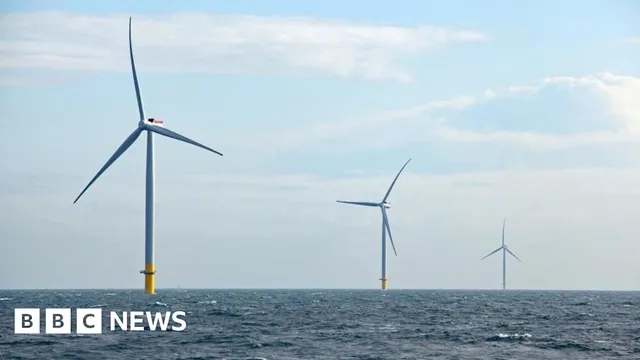
Orsted cancels Hornsea 4 project, threatening UK's clean energy goals
2025-05-07 12:27- Orsted has cancelled its Hornsea 4 wind farm project off the Yorkshire coast, a move sparked by rising costs and economic pressures.
- The UK government previously aimed for significantly increased clean energy production by 2030, including tripling offshore wind capacity.
- The challenge to meet these ambitious targets raises serious questions about the future of the UK’s clean energy mission.
Express your sentiment!
Insights
In a significant setback for the United Kingdom's clean energy ambitions, the Danish energy firm Orsted has recently announced the cancellation of the Hornsea 4 wind farm project, which was planned to be located off the coast of Yorkshire. This ambitious offshore wind farm intended to become one of the largest facilities in the world, boasting a capacity of 2.4GW capable of powering over a million homes, was deemed financially unfeasible by the company. Despite Orsted having previously signed a 15-year contract with the UK government to sell power at an agreed price, rising costs attributed to global inflation and supply chain issues have rendered the project unsustainable. This cancellation follows another setback in the sector, where Swedish company Vattenfall halted plans for a 1.4GW wind farm off Norfolk in July 2023, again due to economic pressures, although the project has since been sold to German company RWE for continuation. The difficulties faced by offshore developers, including soaring construction costs, raise serious concerns regarding the UK government’s ambitious clean power targets set for 2030. Under these targets, the government aims to triple offshore wind capacity and double solar and onshore wind generation, necessitating extensive upgrades to the electricity grid, including the installation of around 620 miles of new power lines and substations. Furthermore, many local communities are expressing opposition to new energy infrastructure projects in their vicinity, complicating the government's clean energy strategy. Industry experts, as well as members of the Conservative and Reform parties, have voiced skepticism about the feasibility of achieving the 2030 targets—emphasizing that the timeline may not allow enough room for the necessary infrastructure development. Dieter Helm, a professor of economic policy at the University of Oxford, has voiced his opinion that fulfilling this ambitious goal within the designated timeframe would be near impossible and could lead to escalation in costs. Chris Stark, head of the government’s Clean Power 2030 mission, acknowledges the challenges involved but remains optimistic that with a major effort, the targets can still be reached. Energy Secretary Ed Miliband has also reaffirmed the importance of the plan in providing energy security while addressing the climate crisis and reducing bills for consumers, insisting that despite setbacks, there remains a potent pipeline of projects that could help achieve these crucial clean power goals by 2030.
Contexts
The cancellation of Hornsea 4, one of the largest offshore wind projects in development in the UK, poses significant challenges to the country's clean energy objectives. As the UK aims to transition to a net-zero economy by 2050, the Hornsea 4 project was expected to play a critical role in providing renewable energy to the national grid. This move reflects broader concerns regarding the viability and sustainability of ambitious renewable energy initiatives amidst rising costs and regulatory hurdles. The UK government had set a target to reach 50 GW of installed offshore wind capacity by 2030, and the cancellation of such a major project represents a setback in achieving this goal, risking energy security and undermining efforts to meet emissions reduction targets. Hornsea 4 was projected to generate power for millions of homes, contributing significantly to the UK's energy mix and reducing reliance on fossil fuels. Its cancellation raises questions about future investments in renewable energy infrastructure, as the challenges faced by Hornsea 4 may discourage investors and developers from pursuing similar projects. Additionally, it could lead to increased energy prices if the gap in renewable energy supply is not effectively filled by alternative projects, thus exacerbating the cost-of-living crisis faced by many households. The implications of this decision extend beyond mere energy generation; it also affects job creation within the green sector, which is critical for a sustainable economic recovery. The offshore wind industry has been seen as a major driver of job growth, with thousands of jobs expected to be created as a result of ongoing projects. With Hornsea 4's cancellation, the UK may face a reduction in employment opportunities in this burgeoning sector, ultimately impacting local economies and stalling the progress towards a green economy. In conclusion, the cancellation of Hornsea 4 has ripple effects across the clean energy landscape in the UK, potentially jeopardizing national energy goals and commitments to climate action. The government and industry stakeholders need to reassess their strategies and bolster support for alternative renewable energy projects to mitigate the impact of this cancellation. Ensuring robust investment in and development of renewable energy infrastructure will be vital for maintaining the momentum towards achieving the UK’s clean energy targets and fulfilling its climate commitments in the years to come.